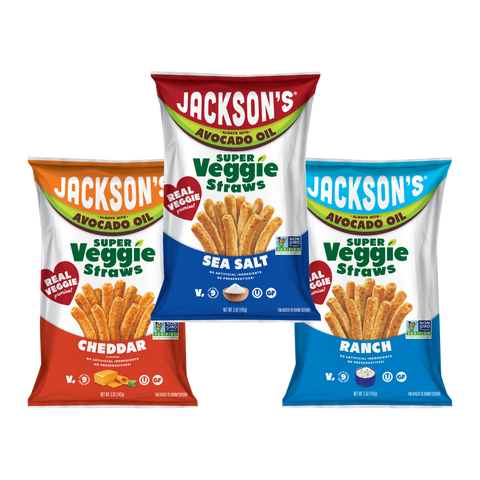Can You Use Coconut Oil Instead of Vegetable Oil?

You've likely seen "vegetable oil" on countless ingredient lists, from baked goods to processed snacks. It's a pervasive ingredient in our modern diet, often falsely touted as a healthier alternative to traditional fats. But at Jackson's, where we're all about seed oil-free snacking, we want to pull back the curtain on vegetable oils and shine a light on a superior option: coconut oil.
The truth is, the term "vegetable oil" is a bit of a misnomer. These oils are typically derived from seeds like soybeans, corn, and canola. While they contain polyunsaturated fatty acids (PUFAs), which are essential in small amounts, the high levels found in many processed foods can be problematic.
The Dark Side of Seed Oils: Inflammation and Processed Foods
Seed oils are often highly processed, undergoing chemical treatments, bleaching, and high-heat extraction. This extensive processing can damage the delicate PUFAs, leading to the formation of harmful compounds. Furthermore, the imbalance of omega-6 to omega-3 fatty acids in many seed oils can contribute to inflammation in the body.
Inflammation is a natural bodily response, but chronic inflammation is linked to a host of health issues, including heart disease, certain cancers, and autoimmune disorders. And unfortunately, processed foods, often loaded with these inflammatory seed oils, are a major contributor to this dietary imbalance.
Enter Coconut Oil: A Tropical Superhero of Health

Coconut oil, on the other hand, is a saturated fat, but don't let that scare you! It's composed of medium-chain saturated fatty acids (MCFAs), which are metabolized differently than the long-chain saturated fats found in animal products. MCFAs are quickly converted into energy by the liver and are less likely to be stored as fat.
Here's why coconut oil is a winning alternative to vegetable oils:
-
Naturally Stable: Coconut oil is highly stable at high temperatures, unlike many seed oils that break down and become harmful when heated. This makes it an excellent choice for cooking and frying.
-
Energy Powerhouse: The MCFAs in coconut oil provide a quick and sustained source of energy, making you feel fuller for longer.
-
Potential Health Benefits: Studies suggest that the lauric acid in coconut oil, a type of MCFA, may have antimicrobial properties, helping to fight off harmful bacteria and viruses.
-
Delicious Flavor: Unrefined, virgin coconut oil adds a subtle, tropical flavor to your dishes, which can be a welcome change from the blandness of vegetable oil.

Making the Switch: Coconut Oil in Your Kitchen
Swapping vegetable oil for coconut oil is easy! It's a 1:1 substitution in most recipes. Since coconut oil is solid at room temperature, you'll need to melt it before adding it to your ingredients, especially in baking.
For cooking, coconut oil is perfect for stir-fries, sautéing vegetables, and even frying. Its high smoke point means you can cook at higher temperatures without worrying about the oil breaking down.
Read: Substituting avocado oil for vegetable oil
If you're new to coconut oil, you can start by substituting half of the vegetable oil in your recipes to get used to the flavor. But we encourage you to make the switch completely to experience the full benefits of a seed oil-free diet.
Committed to the Seed Oil-Free Lifestyle
At Jackson's, we're passionate about creating delicious snacks that are free from harmful seed oils. While we no longer make coconut oil snacks due to manufacturing, we are a fan of this oil in our everyday life. We now always use seed oil-free high-quality avocado oil in our snacks. We believe that snacking should start with using wholesome, nourishing ingredients.
Note our coconut oil sweet potato chips and unsalted coconut oil sweet potato chips are no longer available.
So, the next time you reach for that bottle of vegetable oil, consider making the switch to coconut oil. Your body will thank you for it, and you'll be taking a step towards a healthier, less inflammatory diet. And of course, don't forget to grab a bag of Jackson's for a truly seed oil-free snacking experience!No Seedy Oils Here
Avocado Oil Goodness Meets Irresistible Flavor - No Seed Oils Here!
-

 8 Pack New Arrival!Variety Pack Super Veggie Straws in Avocado Oil 5oz (Pack of 8)
8 Pack New Arrival!Variety Pack Super Veggie Straws in Avocado Oil 5oz (Pack of 8)Variety Pack
Super Veggie Straws in Avocado Oil
- Size
- 5oz bags
- Regular price
- $35.99
- Sale price
- $35.99
- Regular price
-
$35.99 (Liquid error (snippets/product-price line 131): divided by 0 per bag) - Unit price
- per
-

 8 Pack New Arrival!Sea Salt Variety Pack Snacks in Avocado Oil 5oz (Pack of 8)
8 Pack New Arrival!Sea Salt Variety Pack Snacks in Avocado Oil 5oz (Pack of 8)Variety Pack Snacks
Sea Salt in Avocado Oil
- Size
- 5oz bags
- Regular price
- $35.99
- Sale price
- $35.99
- Regular price
-
$35.99 (Liquid error (snippets/product-price line 131): divided by 0 per bag) - Unit price
- per
-

 8 Pack Best SellerSea Salt Sweet Potato Chips in Avocado Oil 5oz (Pack of 8)
8 Pack Best SellerSea Salt Sweet Potato Chips in Avocado Oil 5oz (Pack of 8)Sea Salt
Sweet Potato Chips in Avocado Oil
- Size
- 5oz bags
- Regular price
- $35.99
- Sale price
- $35.99
- Regular price
-
$35.99 (Liquid error (snippets/product-price line 131): divided by 0 per bag) - Unit price
- per
-

 8 PackVariety Pack Kettle Chips in Avocado Oil 5oz (Pack of 8)
8 PackVariety Pack Kettle Chips in Avocado Oil 5oz (Pack of 8)Variety Pack
Kettle Chips in Avocado Oil
- Size
- 5oz bags
- Regular price
- $35.99
- Sale price
- $35.99
- Regular price
-
$35.99 (Liquid error (snippets/product-price line 131): divided by 0 per bag) - Unit price
- per







